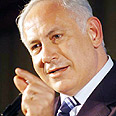
Likud
Chairman: Benjamin Netanyahu
- Israel will not allow the establishment of an Arab Palestinian state west of the Jordan River. The Palestinians will be able to manage their lives freely in the framework of an autonomous regime, but not as a sovereign, independent state.
- The Jordan River will be the State of Israel's permanent border. Jerusalem will not be divided and the expansion of Jewish neighborhoods in east Jerusalem will continue. The boosting of Jewish settlement activity in the Golan Heights will continue.
- The Likud pledges to continue to strive for peace with Syria without preconditions.
- Israel will strive for a free economy while integrating into the global village, encouraging privatization, and greater exposure to competition. A tax reform will be introduced and greater investment would be made in development towns. Additional government assistance will be offered in order to expand the job market and minimize unemployment.
- Boosting Jewish, Zionist, and national elements at schools. When it comes to Arab and Druze educational facilities, the Likud pledges to act in order to prevent students from dropping out of school and boost the level of achievements.
Party history:
The Likud movement can be traced back to the formation of the Herut movement by Menachem Begin upon Israel's establishment. Later the movement joined forces with the Liberal movement, and in 1973 joined forces with more elements that set up the Likud. In 1977, the party won 45 Knesset seats in the elections and for the first time rose to power. In 1979, Begin signed the peace treaty with Egypt. In 1982, a Likud-led government initiated the Lebanon War, eventually prompting Begin to resign and quit public life. His replacement Yitzhak Shamir, formed a national unity government with Labor.
In 1997, Likud Prime Minister Benjamin Netanyahu signed the Hebron agreement with the Palestinians and a year later signed the Wye agreement. In 2001, Netanyahu made way for Ariel Sharon at the helm of the party. Sharon later initiated the disengagement plan that saw Israel remove settlements in the Gaza Strip and northern West Bank. Sharon later quit the party ahead of the upcoming elections and formed the Kadima party.
Notable figures:
Benjamin Netanyahu
Silvan Shalom
Reuven Rivlin
Natan Sharansky
Gideon Sa'ar
Uzi Landau
Limor Livnat
Danny Naveh










